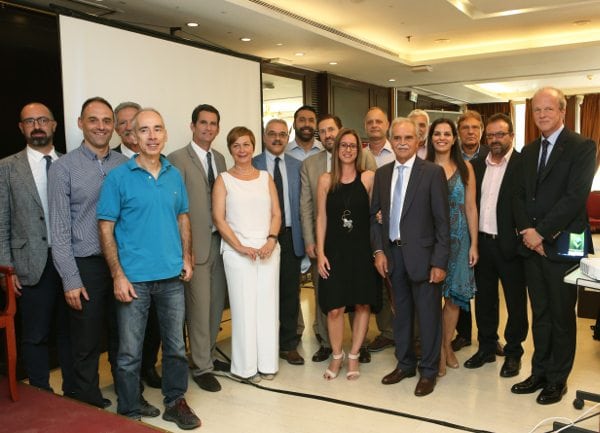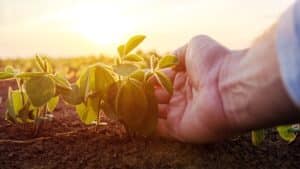More than half of Greece’s arable land is used for field crops, the rest for trees, vines and vegetables. Apart from the current difficult economic situation in Greece and the reduction of funding from the banks, the seed sector companies also have to cope with a recent legislative change, allowing producers to buy cheap seeds from other neighbouring EU countries where the quality of the seeds is questionable. All EU companies can operate in Greece for the distribution of planting seeds to farmers, without some obligations that the Greek companies have to follow. As a result, unfair competition is created for Greek companies which are also subject to very heavy taxes. The Greek Propagating Material Companies Association (SEPY) brings together national and foreign companies and represents at least 80 per cent of the Greek seed market value. It promotes the interests of association members by taking part in committees set up by the Greek government.
The total crops and land lying fallow in Greece cover an area of 3.3 million hectares. 52.9 per cent (1,737 thousand ha) of this land is covered with crops on arable land, while 33.9 per cent (1,111 thousand ha) represents tree and vine crops and 2.0 per cent (67.3 thousand ha) is used for vegetables. Olive cultivation has a major role in Greek agriculture, since it covers 821 thousand ha.
Crops grown on arable land:
- 722 thousand ha of cereals (durum wheat, soft wheat, barley etc)
- 147 thousand ha of corn
- 269 thousand ha of cotton
- 94 thousand ha of sunflower
- 371 thousand ha of fodder plants (mainly alfalfa)
The cereals are cultivated all over the country, but mostly in the central and northern part of it. In the same part of the country one can also find the majority of cotton, corn and sunflower crops, while vegetable crops are located mostly in southern Greece and the island of Crete. The structure of Greek farms is generally small, since the average farm runs to about 5 ha.
The contribution of the agricultural sector to the Gross Domestic Product is officially 3.5 per cent (unofficially, we believe it is actually much more, as there is a great percentage of self-consumption, etc.) and employment at 9.5 per cent. A large number of companies operate in local seed production and trade of certified seeds. The majority of them are Greek, but there are also local branches of international companies. According to the Greek legal framework, a company can either produce or trade seeds as a wholesaler or retailer. The sectors in which these companies are active are the following:
- At least 2,000 small companies in retail sale, which also sell plant protection products and fertilizers to the farmers
- 100 companies in certified planting seed production
- 100 companies in wholesale trade of certified seeds
The seed multiplication area is about 24,106 ha, its production varies from 45,000 to 50,000 tons annually and includes mostly cereals, cotton and fodder plants.
Apart from the current difficult economic situation in Greece and the reduction of funding from the banks, the seed sector companies also have to cope with the fact that due to a recent change to EU and Greek legislation, producers can now buy seeds from other neighbouring EU countries where the quality of the seeds is questionable and hence the cost can be significantly lower. In addition, all companies that are based in an EU country can operate in Greece for the distribution of planting seeds to farmers, without some obligations (e.g. minimum number of agronomic staff, etc) that the Greek companies have to follow. As a result, unfair competition is created for Greek companies which are also subject to very heavy taxes.
History
The Greek Seed Trade Association (EEPES) has been an independent professional association that was established in 1983. The seat of EEPES has always been Athens. The association represents the interests of seed manufacturers and suppliers, and brings together leading international and Greek companies that work in the field of plant breeding, development, seed production and trade in Greece.
The activities of member companies cover very many different crops, such as cereals, cotton, corn, sunflower, oilseed rape, alfalfa, common vetch, seed potatoes, vegetables, forage peas, forage grasses, etc.
In order to broaden its field of crop representation and attract more members (such as companies active in the tree and vine sector), EEPES was renamed in 2017 into SEPY, which in Greek stands for “Greek Propagating Material Companies Association”.
Organizational structure
The association’s governing bodies are the General Assembly of the association and the Board of Directors. The General Assembly is the highest governing body of the association, and meets at least once per year.
The Board of Directors is a governing body of the association that convenes at least four times per year between General Assembly meetings. The General Assembly determines the composition of the board through an electoral procedure that takes place every three years. To date, there are seven members of the board. The president of the board organizes and guides the activities of the association. Since March 2016, Efthymios (Thymis) Efthymiadis (CEO of Bios Agrosystems S.A.) has been president of the board. The executive body of the association has the everyday executive authority, headed by the general director of the association. To date, the general director of the association is Evangelos Zangilis, an agronomist with many years of experience in planting seeds, gained both in the public sector, as well as in the private sector.
SEPY is an association with a democratic structure. Although companies with different structures and interests are members, democratic decisions are respected by all members, after sufficient discussion within the board, or even the general assembly, if necessary.
At the international level, SEPY is currently a member of the European Seed Association (ESA) and the International Seed Federation (ISF). In addition, there are also close contacts with other national seed associations and particularly with the other associations that operate in the field of agricultural inputs, such as the Greek Crop Protection Products Association and the Greek Fertilizer Trade Association.
Committees
The technical committees have always had a key role in SEPY’s organizational structure. At present, there are two such committees focused on their responsibility issues, which consist of delegated representatives of association member companies.
The activities of the Committee on Arable Crops and Seed Production and the Committee on Vegetables and Seedlings aim to:
- Discuss thoroughly all technical issues in their field with the help of experts on seed production and certification that are invited to participate when needed;
- Facilitate communication between members of the association, and discussion of the issues within the jurisdiction of the committee that arise in the professional activities of association members;
- Determine the actual questions and/or urgent problems in their field and put them under consideration to the board of directors, which then determines the position for action or response of the association for the promotion of the necessary initiatives;
- Record and evaluate the problems that arise during the implementation of legal regulation and proposing improvements, and;
- Measure the market size and other market characteristics per segment in the seed business.
Number of Members
The association brings together about 40 national and foreign companies that are active in breeding, reproduction and seed trade in Greece. The association’s members represent at least 80 per cent of the Greek seed market value. SEPY’s members are active all over the Greek territory and their regional diversity provides local employment to many hundreds of professionals.
The association is always open to companies that chose to act with a policy framework that enhances reliability, transparency and efficiency in the agricultural inputs market of Greece.
Aims and Tasks
The association’s main objectives include the following:
- Active participation in the development of relevant legislation
- Ongoing cooperation with governmental authorities
- Promotion of the interests of association members by taking part in committees set up by the Greek government
- Keep members up to date as far as the National, European and World seed sector developments are concerned, providing all necessary information
- Organize and conduct seminars and workshops
- Jointly promote the common interests of the agricultural inputs sector
- Inform all stakeholders about the positive contribution of the Greek agricultural sector to overall economy and society
Main Successes
- Following a SEPY’s request, the Greek Ministry of Agriculture decided to fund a three-year program (2016-2018) for the promotion of certified seed use.
- VAT for planting seeds was reduced from 24% to 13%.
- The obligation to use certified seed in order for the farmer to receive the coupled subsidy, in the cases of durum wheat and cotton.
- In the CAP 2014-2020, the majority of seed production was included in the coupled EU subsidies.
- Greek companies’ introduction to the ISF and ESA activities.
- Hosting and organizing of the ISF World Seed Conference in Athens, in 2013.
Key Events
In 2013, the ISF World Seed Congress was held in Athens with more than 1,500 delegates, which was a new record for this congress. Since then, many Greek companies have shown increased interest in the global seed sector progress and have also initiated export activities of locally produced seeds.
In February 2016, in cooperation with the Greek Crop Protection Products Association during the AGROTICA 2016 exhibition, SEPY organized an event titled “The next day of agricultural sector and the role of inputs”. The event was attended by politicians, journalists, representatives of the university community and the seed sector; the event was the first initiative to address a wider audience in informing attendees about the importance of planting seeds and plant protection products.
In September 2017, in cooperation with the Greek Crop Protection Products Association and the Greek Fertilizer Trade Association, SEPY organized an Athens event titled “The contribution of inputs to the agro-food sector” with the participation of important speakers such as Garlich Von Essen (General Secretary of the European Seed Association), Georgios Rapsomanikis (Senior Economist in Food And Agriculture Organization of the United Nations) and Greek university professors with significant research experience in the field of agricultural inputs.
Future Plans
- Inform the general public about the positive contribution of the agricultural inputs to the Greek economy and society, through a more close and formal cooperation with the other two associations in the inputs sector.
- Promote the key role of the seed sector and the innovations which it develops in facing the future challenges concerning food, feed and fiber, in the ever-growing world population.
- Establish the necessary legislation and improving the control mechanism, in order to minimize the “black seed” trading.
- Contribute to the establishment of a Greek royalty collection system regarding Farm Saved Seeds (FSS).
Where on the Web: Greek Propagating Material Companies Association (SEPY) http://www.eepes.gr/index.php/en/
Source: SEPY













